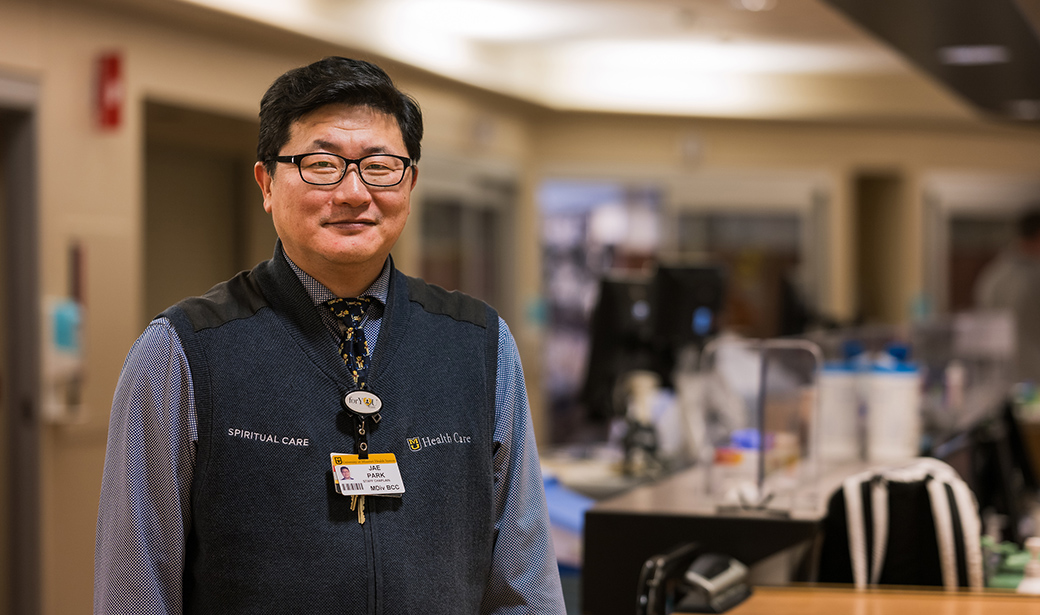After eight years of radio news reporting in South Korea, including a particularly stressful presidential election, Jae Park needed a break. He took a year off and went to stay with his wife’s family, who lived in Bloomington, Indiana.
That was 15 years ago. Now, he’s lived in Columbia for the past five years, working as a staff chaplain at MU Health Care. While Park switched careers for personal, religious and spiritual reasons, he says his job isn’t to preach — it’s to help people through difficult times, or to celebrate milestones with them.
“I just want to let them know that they are not alone, that the chaplains and this hospital really care about their spiritual well-being,” Park said.
Park covers Women’s Hospital, the pediatric units and the medical intensive care unit (ICU). Chaplains often get paged for comforting the families of critically ill patients and helping them decide end-of-life care. Chaplains can administer last rites, rituals such as baptism or offer simple prayers. If a chaplain is ordained — like Park — they can also facilitate marriages. Spiritual care isn’t necessarily about taking care of the patient or their family, though.
“Chaplaincy is more like being with them, walking with them, holding their hands, not leading or pushing them,” Park said. “Sometimes even words are not worthy. Touching them and hugging them (can be) everything.”
Park didn’t realize how powerful a reassuring hand could be, though, until he needed someone himself.
It was mid-November of 2019 on a horribly cold, snowy night. The kind of weather perfect for curling up in a blanket and drinking hot cocoa, not for walking and certainly not for driving, but Park had no choice. To become a board-certified chaplain, he needed to send his application materials in, and it was the last day to mail them. He got in his car and headed to the FedEx office in downtown Columbia.
Park’s GPS picked the absolute worst day to malfunction, leading him away from downtown onto unfamiliar roads. His car didn’t have proper tires to navigate the snowy roads – he was stuck, but a good Samaritan passed by.
“There was one guy who helped me turn around my car,” Park said. “Then, all of a sudden — I still remember the color — a white Toyota SUV drove down the hill and lost control on the snowy pavement. The car slid toward me. I was thinking, ‘Oh my God, am I dying? Like this?’”
The driver somehow angled the car in such a way that it missed Park — barely. He was alive, and no one was hurt.
“But after that, I couldn’t do anything,” Park said. “I was in shock. And the young guy still tried to help me, and he kept pushing my car and turned it around.”
Park thanked the man, profusely, but asked for another favor.
“Could you hold my hands for a bit?”
And he obliged.
“He just took off his gloves and grabbed my hands, holding them,” Park said. “I felt warmth, and my heart was relieved. And melting. I’m teary, I could feel my brain start working again.”
It wasn’t until later that Park realized, wait, that’s what I do. That’s the kind of work he does.
“Being board-certified, what it really means to me is, I'm ready to be with you. I have time to chat with you. I'm ready to hold your hands warmly,” Park said. “We are not superstars or the superhero leading or saving. We are just focusing on the people who lost their beloved one.”
Park’s supervisor, Art Dyer, begs to differ, calling him a “rock star” for his actions during the worst of the COVID-19 pandemic. In lockdown, Park helped connect patients with their family via video call, and took care of the staff, too. He began “Tea for the Soul,” where he’d push a cart stocked with tea and positive messages during his rotations.
“At that time, I thought that Americans are only coffee drinkers,” Park joked. “Not all the people, but the nurses especially love tea. Then, I ask, “How are you feeling today? How is your day going?’ Kind of like having chaplain sessions with our staff, just checking on that person as a person, as another human.”
While moments like talking about tea make him miss South Korea, he’s happy to be living in the United States — after all, it’s where his kids grew up, and the place they call home. Without MU Health Care, his kids may have had to return to a place they no longer remembered.
“I literally sent almost a hundred resumes around the United States,” Park said. “I didn’t have any offers but here. MU Health Care is my savior, my family’s savior, because they supported me to become a permanent resident.”
Park has been a permanent resident in the U.S. for a year and hopes he’ll be able to continue his impactful work, which Dyer says our patients have only benefited from.
“Jae (Park) has found his calling in life as a chaplain here at MU Health Care. He is totally dedicated to helping those in need,” Dyer said. “We are blessed to have him on the spiritual care team, and I am privileged to have Jae as a colleague and friend.”



